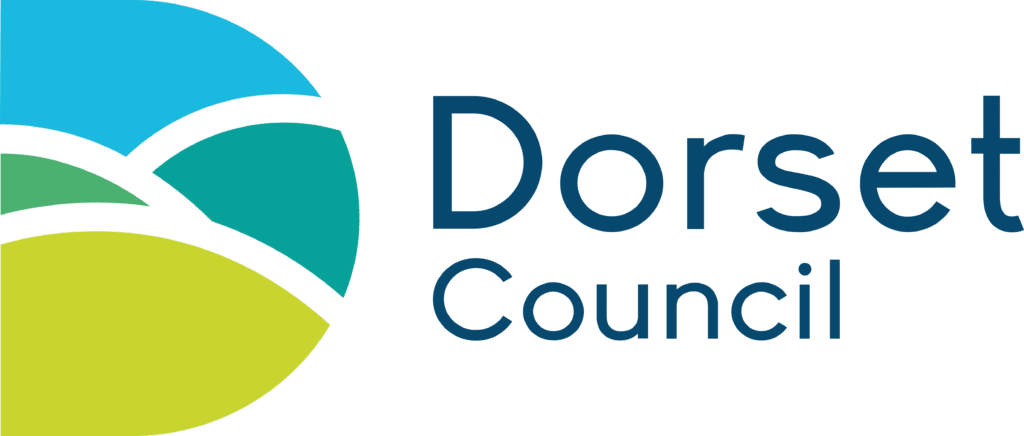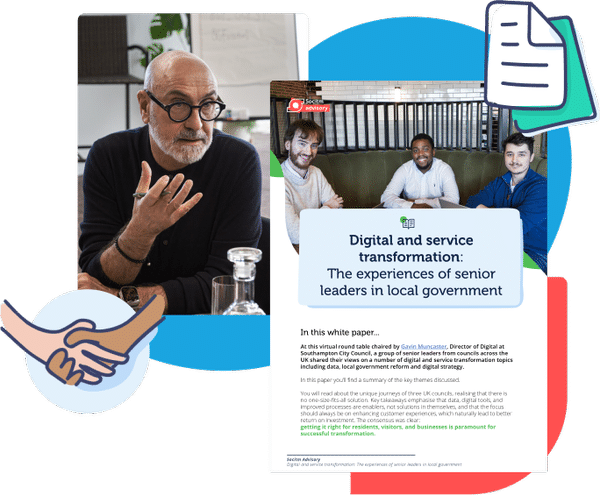Executive summary
At this virtual round table chaired by Gavin Muncaster, Director of Digital at Southampton City Council, a group of senior leaders from councils across the UK shared their views on a number of digital and service transformation topics including data, local government reform and digital strategy.
In this paper you’ll find a summary of the key themes discussed.
You will read about the unique journeys of three UK councils, realising that there is no one-size-fits-all solution. Key takeaways emphasise that data, digital tools, and improved processes are enablers, not solutions in themselves, and that the focus should always be on enhancing customer experiences, which will naturally lead to better return on investment. The consensus was clear: getting it right for residents, visitors, and businesses is paramount for successful transformation.

How to get started with a digital strategy and relate it to wider transformation efforts: Southampton City Council’s story
Initial technology challenges
In 2020, Southampton City Council faced significant technological hurdles, including outdated IT infrastructure and over reliance on desktop PCs. To address these issues, the council developed an initial IT strategy aimed at updating fundamental technology needs.
Acceleration due to Covid-19
The Covid-19 pandemic accelerated the council’s shift towards remote working and flexible environments, highlighting the need for a comprehensive digital strategy. By mid-2022, with a stable IT foundation, the council sought to expand into a broader digital strategy.
Consolidation of digital functions
Recognising scattered digital functions across departments, the council consolidated these efforts into a cohesive digital strategy. External consultants conducted a maturity assessment to evaluate digital skills and capabilities, providing a solid evidence base for strategy development.
Focus areas of digital strategy
The council’s digital strategy focused on AI, automation, and system consolidation to address technical debt and prepare for future advancements. This strategy was integral to the broader transformation efforts, ensuring digital initiatives supported overall transformation goals.
Emphasis on sustainable change
Facing financial pressures, the council’s transformation programme relied on digital tools and automation for sustainable change. By emphasising process rethinking and improving interactions between departments and with customers, the council ensured technology enabled effective transformation rather than merely automating existing methods.
Validation and engagement
Independent validation of progress was crucial, confirming IT advancements and facilitating department engagement. This approach focused on business goals, securing participation and buy-in.
Integration into business cases
Departments are now incorporating the digital strategy into transformation business cases, allowing for long-term planning aligned with available digital tools.
Conclusion
Southampton City Council’s journey exemplifies the evolution from an initial IT strategy to a comprehensive digital strategy. Their methodical approach involving external validation and cross-departmental engagement, established a robust foundation for digital initiatives. Aligning the digital strategy with broader transformation goals positions the council to leverage technology effectively for sustainable change.

How to manage your customer experience through local government reform: Insights from Dorset Council
Formation and mission
Dorset Council, created in 2019 through the merger of six councils, prioritises enhancing resident experience, through local government reform. By integrating multiple systems and data sources, the council aims to understand and address resident needs, particularly focusing on its priorities, for example, the cost of living.
Evolution of customer services
Building on foundations from legacy councils, Dorset Council has transformed its customer services centre into a 24/7 operation, envisioning a consolidated “one Council front door” experience. Significant progress has been made although challenges remain in aligning services and overcoming operational silos.
Transformation strategy
The council’s 5-10 year transformation strategy emphasises intervention, prevention, and demand management, leveraging insights from customers to streamline processes and reduce fragmentation. Shifting traditional contact methods to digital and self-service channels and automating processes is a key focus, while ensuring support is maintained for complex and vulnerable cases.
Technological integration
Financial constraints drive the council to leverage technology for efficiency savings, with successful initiatives in areas like planning, garden waste, child work permits, energy efficient homes and blue badge processing. There are still challenges in converging such diverse systems, unfortunately exacerbated by external factors such as the pandemic and cost-of-living crises.
Digital engagement and automation
To promote digital engagement, Dorset Council employs community digital champions and is developing a single sign-on system. Automation, facilitated by platforms like UI Path and Place Cube, enhances service delivery. Internally, Microsoft Power Automate has been used to create 600 workflows for work management and business intelligence.
Data-driven decision-making
Dorset Council’s approach emphasises data-driven decision-making, technological integration, and continuous improvement to achieve a one council, efficient, responsive and customer focused service.

Finding a single view of debt is important for councils, but how do you get started? East Riding of Yorkshire Council’s story
Initiating a transformative data strategy
East Riding of Yorkshire Council embarked on a data strategy journey to tackle poor data quality and underutilisation. A 14-month project with external specialists uncovered significant data challenges, highlighting excessive off-system spreadsheets and prompting the adoption of Azure for data warehousing.
Focusing on use case-driven initiatives
The Revenues and Benefits department sought a single view of debt and wanted to purchase a new system, but recognised the need to review data first. A 12-week discovery phase reviewed major debt processes, revealing inefficiencies and the interconnectedness of debt with vulnerability and complexity.
Outline business case and redesigning services
The discovery phase led to an outline business case showing potential returns from improved debt recovery and process automation. This initiated discussions on redesigning the debt recovery service to be more customer-centric, including online payments for missed council tax.
Emphasising data’s critical role
The council’s approach emphasised data’s critical role in organisational change. Targeted projects were used to build momentum and demonstrate data’s value, ensuring system investments were based on a solid understanding of data and processes, leading to sustainable solutions.
Further support
Produced with the support of:
- Gavin Muncaster, Director of Digital – Southampton City Council
- Lisa Cotton, Corporate Director Customer and Cultural Services – Dorset Council
- Kat Taylor, Digital Facilitator – East Riding of Yorkshire Council

Get in touch or book a meeting with our Account Director, Alex Fillingham, to discuss your digital and service transformation journey with us.
